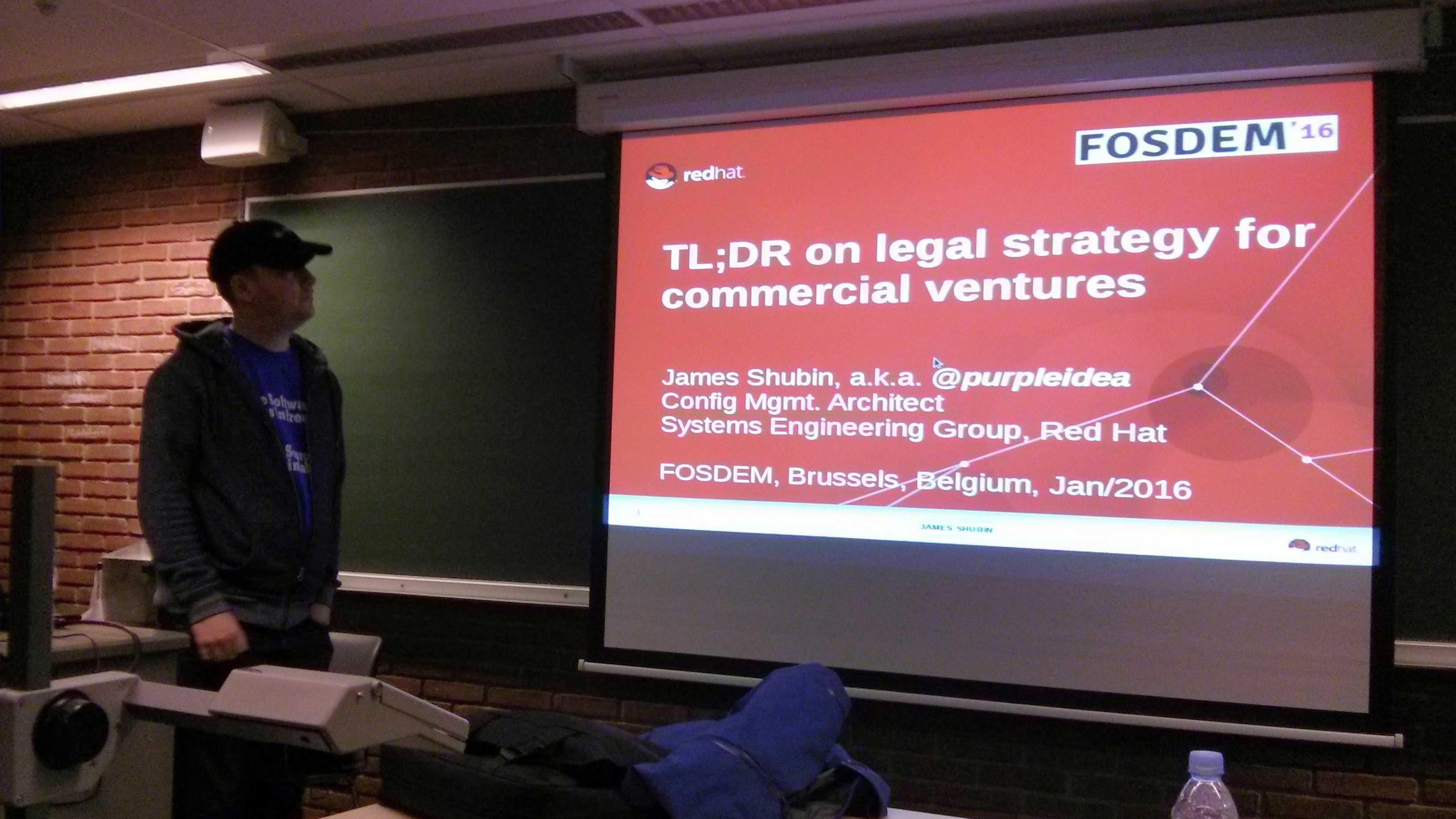
Disclaimer: I attended FOSDEM in Brussels last January. I should have written this weeks ago but better late than ever, right?

After an interesting Friday (as I told you yesterday) our FOSDEM Saturday started early. I attended a couple of talks in the Free Java DevRoom, another couple about Open Source Design but surprisingly most of them were in the Legal and Policy Issues track.
This doesn't mean that this is what matters most to me now (and it matters, a lot), but surely there are other events to listen about containers, virtualisation, Java or Python. IMO, there's no better place than FOSDEM's Legal DevRoom to feel the pulse of the FOSS community.
Let me summarize:
- The State of OpenJDK, by Mark Reinhold (@mreinhold, Chief Architect of the Java Platform, Oracle). The annual review by Mr. Reinholm here in FOSDEM. Main ideas:
- OpenJDK is growing with a lot of new projects (and not only commanded by Oracle)
- 9 main projects and more than 72 JEPs (in that moment) targeting JDK9, including JavaDoc.Next, search capability in Javadocs (powered by Javascript)
- Mark gave interesting tips about Valhalla Project, that may enable Java to have Classes without instances
- He also highlighted Panama Project, an improvement in the JNI to enrich connections between the Java VM and non-java APIs (mostly for C/C++)
- This Is Not A Drill - Preparing for JDK 9, by Dalibor Topić (@robilad, OpenJDK Product Manager, Oracle) and Rory O’Donnell (OpenJDK Quality Manager, Oracle). A compilation of accumulated wisdom obtained by projects testing JDK9 early access builds. We already knew that, for the first time, JDK9 will not be fully backwards compatible so some tips about how to prepare your projects for JDK 9 were necessary. If you lead a Java project, you need to pay special attention to JEP 260 (internal APIs will be inaccesible), JEP 162 (removal of some deprecated methods), JEP 220 (changes in the binary structure of JRE and JDK), JEP 261 (the new module system) and JEP 223 (new version-string scheme)
- Designing accessible applications, by Samuel Thibault (computer science assistant professor). Yet another talk about accessibility, I've attended a lot of them and sadly they tend to be the same talk again and again. An interesting thought was that the UN Convention of the Rights of Persons with Disabilities states that if you (as a developer/company) don't make reasonable accommodations for disabled people, you are discriminating them
- Blender as virtual studio lighting playground, by Tuomas Kuosmanen (@tigert, GIMP developer and artist). I attended this talk mostly to meet @tigert but also to see the actual status of Blender (I played with it for a while centuries ago). The talk was amusing but not very advanced, Tuomas told us about a POC he made to recreate a photography studio lightning set-up with blender
- Copyleft For the Next Decade, by Bradley M. Kuhn (President at Software Freedom Conservancy and on the Board of Directors of the Free Software Foundation). Perhaps my favourite talk of the day, Bradley is a great expert about Open Source and maybe the main Copyleft enforcer nowadays. He gave some tips to pursue software freedom, and how all of this is in danger if license violations are note enforced. Sadly, he said, given any open source project there's almost always a proprietary version forked from it. A famous example is Apple when they forked BSD. I leave you with an important thought: If Copyleft is not enforced, is there any difference?
- Who controls your project? Governance in the real world, by Jesús M. Gonzalez-Barahona (@jgbarah, URJC professor and Bitergia co-founder). Jesús gave a very complete talk about metrics related to governance, and using Bitergia's tools he showed how it's possible to know interesting things about a project like:
- Who contributes? Not only individually, sometimes you want to know how they are affiliated
- How are the changes been reviewed? How are they fixing the tickets? Are we neutral?
- A project's Pony Factor: the lowest number of committers whose total contribution constitutes the majority of the codebase
- A project's Elephant Factor: just as the Pony Factor, but with companies
- Geographical diversity, gender diversity, ...
- TL;DR on legal strategy for commercial ventures, by James Shubin (@purpleidea, Engineer at Red Hat). James gave the audience a lot of recommendations on choosing a software license. He also explained how a lot of people mix up the concepts of proprietary license and commercial license. He remarked that Copyleft is also the best solution for any employer, because it protects them from a developer/s leaving the company and forking the project. He gave some other examples about how Copyleft has a lot of synergies with profit.
- Open Source is being ruined and it’s all our fault, by Brian Harrington (@brianredbeard). In the same line of the previous talk, RedBeard explained the good vs the bad ways to profit in Open Source. The good ones are mainly (no surprise here): Selling a "boxed" product, selling support or selling subscriptions
Now listening to "This is not a drill - Preparing for JDK 9" #FOSDEM pic.twitter.com/RU9km0p6t5
— Esther Lozano (@esloho) January 30, 2016
Full room at "Who controls your project?" @jgbarah talk!! Open Development Metrics for governance analysis #fosdem pic.twitter.com/Fd70nrqZey
— Bitergia (@Bitergia) January 30, 2016
Loved first prediction by @purpleidea :) We are taking AGPLv3 seriously here! #FOSDEM2016 pic.twitter.com/tYkHJ7eAWm
— Taiga.io (@taigaio) January 30, 2016
You can read about the rest of my FOSDEM here:





